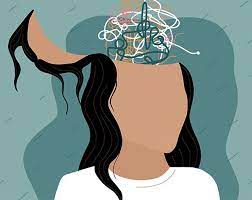Depression is a real mental illness that affects many people around the world. Unfortunately, there are a lot of myths and misconceptions about depression that can make it difficult for people to know the facts about this condition. And get the right kind of help. So, in this article, we will dispel some of the most common facts about depression and provide ways to deal with this serious condition. Keep reading on!
Contents
Defining Depression
 Depression is defined as a low mood or a general feeling of dissatisfaction. It may be accompanied by low self-esteem, feelings of hopelessness and helplessness, anxiety, and sometimes physical symptoms such as fatigue or pain.
Depression is defined as a low mood or a general feeling of dissatisfaction. It may be accompanied by low self-esteem, feelings of hopelessness and helplessness, anxiety, and sometimes physical symptoms such as fatigue or pain.
Depression is real and more than just feeling down for a few days. It’s a serious mental health disorder that requires treatment by a professional. Depression is a real and common problem that affects millions of people every year.
Moreover, depression is not a sign of weakness or something that you can just “snap out of.” It’s a real medical condition that requires treatment. There are several myths revolving around depression that can make it harder for people to understand and seek treatment.
6 Interesting Facts About Depression
It is important to remember that depression is a real thing. And, not just feeling blue or down in the dumps. Depression is a serious mental illness that can have devastating consequences if left untreated
It affects more than 350 million people of all ages, making it one of the leading causes of disability worldwide. Here are six facts about depression:
Can Happen Without Any Reason
In studies, it has been found that up to 60% of people who suffer from depression do not have any specific reason for their condition. This means that the person’s brain chemistry is off, and they need help getting it back on track. And this type of depression is more likely related to Clinica Depression.
One profound explanation for this is that some people are just more susceptible to developing clinical depression. This is due to an imbalance in neurotransmitters, which are the chemicals in the brain that relay messages between neurons.
So, in simple terms, the chemicals that are the reason for the regulation of your mood, energy, and sleep are out of whack. This is why people with clinical depression often experience a change in these areas.
Several Factors Can Cause Depression
It should not be surprising that many factors can lead to depression. In fact, researchers are unable to find only one cause that leads to depression in all cases. Instead, it is likely that a combination of genetic, psychological, and environmental factors contributes to the development of depression.
For example, people who have a family member with depression are more likely to experience the condition themselves. This may be due to both genetic and environmental factors. If someone grows up seeing a parent or sibling with depression, they may be more likely to develop the condition themselves.
Additionally, people who have experienced trauma or stressful life events are also at a higher risk of developing depression. Therefore, it is important to be aware of the different factors that can contribute to the development of depression.
Depression Is Real, Not Just an Ordinary Sadness
 People often think that depression is just an ordinary sadness. However, it is much more than that. Depression is a serious medical condition that can affect a person’s mood, thoughts, body, and behavior. This condition is a serious illness with several symptoms, these include:
People often think that depression is just an ordinary sadness. However, it is much more than that. Depression is a serious medical condition that can affect a person’s mood, thoughts, body, and behavior. This condition is a serious illness with several symptoms, these include:
- Persistent feelings of sadness, anxiety, or “empty” moods
- Loss of interest in activities that were once enjoyed
- Fatigue and decreased energy
- Difficulty concentrating, remembering details, and making decisions
- Insomnia or excessive sleeping
- Overeating or appetite loss
- Thoughts of suicide, death, or self-harm
- Restlessness or irritability
Hence, this condition is a real condition and unfortunately, you cannot just “snap out of it.” If you or someone you know is going through these symptoms, please do not hesitate to reach out to a professional for help.
Children Are Also Susceptible To Depression
Depression is not just an adult problem. According to the studies, about three percent of children between the ages of six and twelve have experienced a depressive disorder. This number only continues to grow as children get older; by the time they reach adolescence, that number jumps to five percent. That means that every classroom of 30 students has at least one child struggling with this condition.
There are some common causes of children having depression. Such as bullying, poor grades, the loss of a loved one, or parents who are dealing with their own depression. Children who have anxiety disorders or come from homes where there is a lot of fighting are also at a higher risk for developing depression. Some warning signs that your child may be depressed are:
- changes in eating habits and sleeping patterns
- mood changes
- withdrawing from friends and activities
- poor performance in school
- talk of death or suicide.
Depression Co-exist with Anxiety
 This is a major fact that people must understand. Depression and anxiety can go hand in hand. In fact, studies have shown that people who suffer from this condition are more likely to also have anxiety. This is because the two disorders share some common symptoms.
This is a major fact that people must understand. Depression and anxiety can go hand in hand. In fact, studies have shown that people who suffer from this condition are more likely to also have anxiety. This is because the two disorders share some common symptoms.
For example, someone who is depressed may also experience feelings of restlessness, fatigue, and difficulty concentrating. Additionally, both disorders can cause a person to withdraw from friends and family, have difficulty sleeping, and lose interest in activities they used to enjoy.
While it is important to understand that depression and anxiety often co-occur, it is also important to remember that they are two distinct disorders. This means that someone can experience depression without having anxiety, and vice versa. So, with mental health conditions, you must always consult with a professional to get an accurate diagnosis.
Depression Can Be Treated
This fact is a surprising and definitely hopeful one. Researchers have studies that show that cognitive-behavioral therapy and antidepressant medication are effective treatments for depression. So, if you or someone you know is struggling with depression, please do not hesitate to seek out professional help.
While there are many effective treatments for this condition, it is important to remember that each person experiences the condition differently. What works for one person may not work for another. It is important to work with a mental health professional to figure out the best plan of action for you.
There are also many things that you can do on your own to help cope with depression. One of the most important things is to connect with others. When we feel isolated and alone, it can worsen our depression symptoms. So, you should make an effort to connect with family and friends, even if it feels like a daunting task.
Therefore, these are eight facts about depression that you should know. Depression is real, it is common, and it can be treated. If you or someone you know is struggling with depression, please reach out for help. There are people who care and want to see you get better.
Ways To Cope With Depression
There are numerous ways to cope with this condition. Some people may need medication to get to a healthy state, but there are many things that can be done at home to help ease the symptoms. So, here are some natural remedies for depression:
Exercise Regularly And Stay Active
 Exercise has been proven to be one of the most effective treatments for depression. It releases endorphins, which have mood-boosting effects. And it helps to reduce stress and anxiety. Researchers have found that the depression benefits of exercise are comparable to those of antidepressant medication.
Exercise has been proven to be one of the most effective treatments for depression. It releases endorphins, which have mood-boosting effects. And it helps to reduce stress and anxiety. Researchers have found that the depression benefits of exercise are comparable to those of antidepressant medication.
Because exercising regularly and staying active can help you feel better. It also gives you a sense of accomplishment and boosts your self-esteem. So, make sure to get moving and stay active every day. Even a moderate amount of exercise can make a big difference.
Eat A Healthy Diet
What you eat can affect your mood. Eating unhealthy foods can make depression worse. In fact, a healthy diet is essential to managing any chronic health condition. There are many nutrients that can impact mood, but omega-three fatty acids are particularly effective. These fats are found in salmon, walnuts, and flaxseeds. In addition, there are things that you should include in your diet, such as:
- Whole grains
- Health-Fruits and vegetables
- Protein
- Healthy fats
You should also limit your intake of caffeine and alcohol. Both of these substances can worsen depression symptoms. If you need help making dietary changes, talk to a registered dietitian or your doctor. They can develop a plan that is right for you.
Spend Time In Nature
Nature has always been therapeutic. You don’t have to go on a hike or anything, even just sitting outside in the sun can help improve your mood. And give you some much-needed Vitamin D. Make sure to get up and move around every now and then. Sitting or lying down for too long can actually make depression worse.
Moreover, you can take a walk and try to clear your head. And if you’re feeling up for it, go on a run or do some other form of exercise.
Express Your Feelings Through Writing
Writing is considered to be one of the most effective ways to cope with this condition. It can help you to sort out your thoughts, understand your emotions, and release all the pent-up feelings that are causing you pain. Writing also gives you a chance to look at your situation from a different perspective and find new solutions to your problems.
There are many different ways to express your feelings through writing. You can keep a journal, write poems, or even just write down your thoughts and feelings in a stream of consciousness. However, you choose to do it, make sure that you are honest with yourself and allow your emotions to flow freely.
If you are not sure where to start, try writing about your day-to-day experiences, both good and bad. Write about what is making you happy and what is causing you pain. Be as specific as possible. The more detailed you are, the easier it will be to identify patterns and find solutions.
Stick To A Schedule
 It is important to stick to some sort of schedule when you are depressed. Even if you don’t feel like doing anything, force yourself to get up and do something. Anything is better than lying in bed all day letting your depression take over. Make sure to include healthy activities and things that make you happy in your schedule.
It is important to stick to some sort of schedule when you are depressed. Even if you don’t feel like doing anything, force yourself to get up and do something. Anything is better than lying in bed all day letting your depression take over. Make sure to include healthy activities and things that make you happy in your schedule.
Eventually, you will start to feel better and your depression will start to lift. In addition, if you can’t seem to get out of bed, tell yourself that you will just take a shower. Once you are in the shower, you can decide if you want to continue with your day or not. But at least getting in the shower is a step in the right direction.
Boost Your Self-Image
When you are dealing with depression, you may feel worthless or unable to do anything right. Negative self-talk can become a destructive force in your life, but you can fight back by changing the way you think about yourself.
Focus on building yourself up instead of tearing yourself down. Write down things you like about yourself, even if they seem small. For example, “I am a good friend,” “I am a good listener,” or “I have a great sense of humor.”
Read your list of positive qualities aloud to yourself every day. And add to it as you think of new things. It may seem cheesy at first, but over time you will start to believe the good things you are saying about yourself.
Talk To A Therapist
Working with a therapist can help you understand and work through your depression. They can also provide you with tools and techniques to manage your depression. Sometimes, the condition is severe that it required professional help and medication. However, people with depression can find relief with therapy.
In this condition, psychotherapy is as effective as medication, according to this study. If you want to give therapy a try, make sure to find a therapist that you feel comfortable with and one that specializes in treating depression.
So, these are some topmost ways to manage this condition. But, keep in mind that depression is different for everyone. Some people may find relief with one method, while others may need to combine a few to feel better. If you are struggling with depression, don’t hesitate to reach out for help. A mental health professional will be able to help you develop a treatment plan that’s right for you.
Conclusion
To conclude, it’s important to remember that depression is real, and it can be extremely debilitating. It’s not something that you can just “snap out of”, and it’s not something that you should try to tough out on your own. More often, it’s something that requires professional help, and it’s important to seek out that help if you’re feeling depressed.
There are many different ways to cope with depression, and what works for one person may not work for another. But there are some general things that can be helpful in managing depression. Those are discussed in the above-listed tips. In addition, seek a professional if your depression is getting worse.
For more information, please contact MantraCare. Depression is a mental illness characterized by persistent feelings of sadness, hopelessness, and loss of interest in daily activities. If you have any queries regarding Online Depression Counseling experienced therapists at MantraCare can help: Book a trial Depression Therapy session


